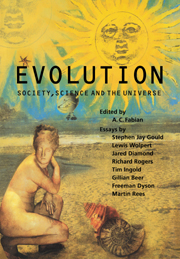Book contents
- Frontmatter
- Contents
- Introduction
- 1 On Transmuting Boyle's Law to Darwin's Revolution
- 2 The Evolution of Cellular Development
- 3 The Evolution of Guns and Germs
- 4 The Evolution of London
- 5 The Evolution of Society
- 6 The Evolution of the Novel
- 7 The Evolution of Science
- 8 The Evolution of the Universe
- Notes on Contributors
- Acknowledgements
- Index
7 - The Evolution of Science
Published online by Cambridge University Press: 25 January 2010
- Frontmatter
- Contents
- Introduction
- 1 On Transmuting Boyle's Law to Darwin's Revolution
- 2 The Evolution of Cellular Development
- 3 The Evolution of Guns and Germs
- 4 The Evolution of London
- 5 The Evolution of Society
- 6 The Evolution of the Novel
- 7 The Evolution of Science
- 8 The Evolution of the Universe
- Notes on Contributors
- Acknowledgements
- Index
Summary
Analogies
I was asked to write about the ‘Evolution of Science’. This is an enormous subject and would take a historian to do it justice. I am not a historian. I am a scientist with a smattering of knowledge about history. I prefer to write about things I know. Here, I tell stories rather than digging deep into the sources of historical truth. I write about astronomy, which is one little corner of science, and about recent events with which I am familiar. I use the recent history of astronomy to illustrate some evolutionary themes, which may or may not be valid when extended to earlier periods or to other areas of science.
My approach to evolution is based on analogies between biology, astronomy and history. I begin with biology. The chief agents of biological evolution are speciation and symbiosis. In the world of biology these words have a familiar meaning. Life has evolved by a process of successive refinement and subdivision of form and function; that is to say, by speciation, punctuated by a process of bringing together alien and genetically distant species into a single organism, i.e. symbiosis. As a result of the work of the biologist Lynn Margulis and other pioneers, the formerly heretical view, that symbiosis has been the mechanism for major steps in the evolution of life, has now become orthodox. When we view the evolution of life with an ecological rather than an anatomical perspective, the importance of symbiosis relative to speciation becomes even greater.
As a physical scientist, I am struck by the fact that the borrowing of concepts from biology into astronomy is valid on two levels.
Information
- Type
- Chapter
- Information
- EvolutionSociety, Science and the Universe, pp. 118 - 135Publisher: Cambridge University PressPrint publication year: 1998
Accessibility standard: Unknown
Why this information is here
This section outlines the accessibility features of this content - including support for screen readers, full keyboard navigation and high-contrast display options. This may not be relevant for you.Accessibility Information
- 4
- Cited by
